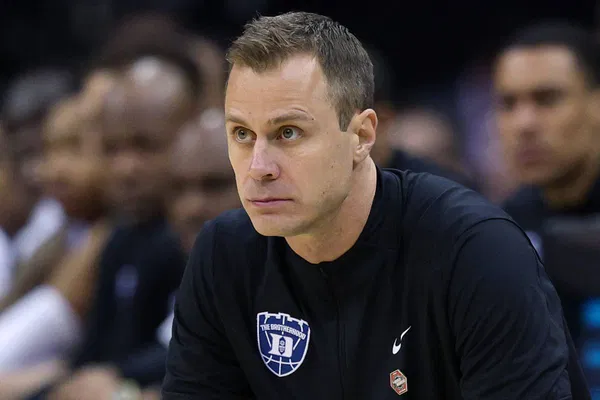
Following Duke’s loss to the Houston Cougars in the March Madness tournament, head coach Jon Scheyer acknowledged his shortcomings, saying, “I didn’t help them enough. That’s where my mind goes.” While he didn’t criticize his players, he admitted to some personal lapses, which fueled debate about whether he’s the right leader for Duke. Stepping into the legendary shoes of Coach K was always going to be a tough challenge, and although Scheyer guided the team deep into the tournament, the failure to reach the championship game cast a shadow over his performance.
To support the coach and elevate the program, Duke’s front office has now taken a major step. The men’s basketball team is reportedly being backed by a massive NIL (Name, Image, and Likeness) budget ranging from $8 million to $10 million for the 2025–26 season. Some sources even suggest the NIL fund is “unlimited,” signaling the university’s commitment to reclaiming its spot at the top of college basketball. Duke is aiming for its first NCAA title since 2015, and this financial backing is expected to make a major impact.
NEW: Following its Final Four exit, Duke is ready to reload with $8M-$10M available in NIL for the 2025-26 roster, @PeteNakos_ reports💰
One source described the NIL war chest as “unlimited.”
Story: https://t.co/7EA13Btphy pic.twitter.com/imLYnhV3ac
— On3 (@On3sports) April 6, 2025
This investment is timely, especially as several key players are expected to move on. Cooper Flagg, Khaman Maluach, and Kon Knueppel are all projected to be first-round NBA draft picks. Isaiah Evans and Tyrese Proctor might also declare for the draft, and Mason Gillis is graduating. With so much turnover, Duke must replenish its roster and maintain competitiveness, and NIL deals can help attract elite high school prospects.
Yet, not all fans are excited about the NIL development. Many argue that no amount of money can compensate for what they perceive as Scheyer’s lack of high-level coaching ability. Some pointed out that even with the best talent, Duke might continue to fall short if Scheyer doesn’t improve his in-game tactics and decision-making. One fan stated, “At some point the money produces diminishing returns. The coach still needs to make game-winning decisions and tactical moves with national championships on the line.”
Duke has developed a pattern under Scheyer — performing well during the regular season and early March Madness rounds, only to falter later. In his first season, he led Duke to an ACC Tournament title and a single NCAA Tournament win before a Round of 32 loss to Tennessee, hindered by a key player’s injury. The following year saw an early ACC Tournament exit and a deeper NCAA run, but again, the team came up short. Critics argue that Duke’s success under Scheyer might have relied more on favorable matchups than coaching prowess.
Some social media users were especially critical. One joked, “Jon Scheyer couldn’t win a championship if his salary cap was higher than the Lakers.” Interestingly, JJ Redick, another former Duke player with no prior coaching experience, is now leading the Los Angeles Lakers to a top seed in the Western Conference. This comparison suggests that even inexperienced coaches can thrive — if given the right tools and opportunities.
After the loss to Houston, Scheyer himself admitted that Duke lacked experience in close games and that he wished he had better prepared them for such moments. He said, “We haven’t been in a lot of those games. We’ve watched a lot of game situations and practiced (it). That’s where I wish I could’ve helped them more.”
While some fans still believe Scheyer is “limited,” others acknowledge that he has achieved notable milestones. He’s the first Duke coach to win two ACC Tournament titles in his first three seasons and led the team to an NCAA Elite Eight appearance.
Beyond Duke, there are growing concerns across college basketball about the effects of NIL. Some argue that NIL is putting undue pressure on players and giving rich programs an unfair edge. Arkansas head coach John Calipari commented that NIL is like a “piano on their back” for players, and ESPN’s Stephen A. Smith warned that the trend could undermine the spirit of college basketball by weakening underdog stories.
In summary, despite Duke’s strong NIL position, doubts about Jon Scheyer’s ability to capitalize on those resources remain. Until he delivers a national title, fan skepticism is unlikely to go away — regardless of how deep the team’s pockets are.